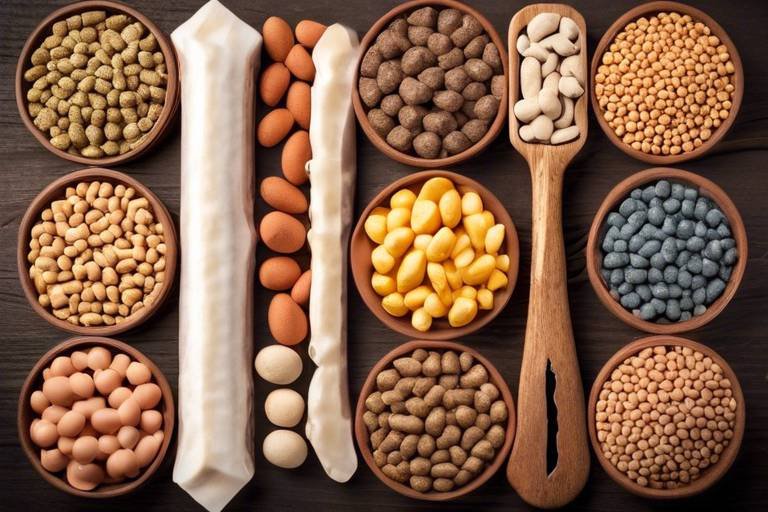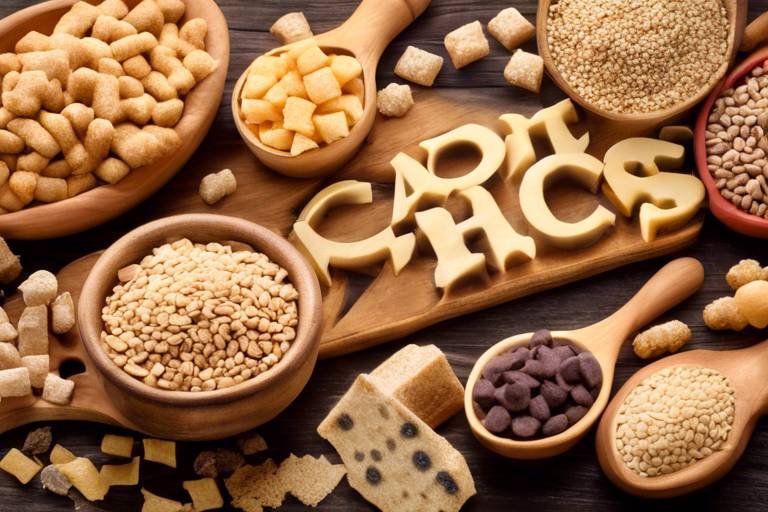How to Address Common Dietary Misconceptions
In a world overflowing with dietary information, it's easy to feel lost amidst the noise. Have you ever caught yourself questioning if you should really be avoiding carbs or if fats are truly the enemy? You're not alone! This article explores prevalent dietary misconceptions, offering clarity on nutrition, health, and food choices. We aim to dispel myths and provide evidence-based insights for healthier eating habits. By the end of this journey, you’ll be equipped with the knowledge to make informed decisions about your diet, debunking those pesky myths that seem to linger like an unwanted guest at a party.
Nutritional myths can lead to confusion about healthy eating. Many of these misconceptions stem from outdated research, sensationalized media headlines, or simply a lack of understanding. For instance, the idea that all fats are bad has been perpetuated for decades, yet this couldn't be further from the truth! This section delves into common misconceptions and their origins, helping readers differentiate between fact and fiction in dietary advice. When we understand where these myths come from, we can better navigate the vast sea of nutritional information and make choices that truly benefit our health.
Carbohydrates are often misunderstood and unfairly vilified. Many people believe that cutting carbs is the key to weight loss, but this is a gross oversimplification. Carbs are our body's primary source of energy, fueling everything from our daily activities to our workouts. Here, we explain the importance of carbohydrates in a balanced diet and debunk myths surrounding their consumption. Instead of fearing carbs, we should focus on choosing the right types and amounts that fit our individual needs.
Not all carbohydrates are created equal. The distinction between simple and complex carbohydrates is crucial for understanding their impact on our health. Simple carbohydrates, found in sugary snacks and beverages, can lead to quick spikes in blood sugar levels. In contrast, complex carbohydrates, such as whole grains, legumes, and vegetables, provide a steady release of energy and come packed with essential nutrients. This subsection clarifies the differences between simple and complex carbohydrates, emphasizing their unique roles in our diet and energy levels. By making informed choices, we can enjoy the benefits of carbs without the pitfalls associated with their overconsumption.
Choosing the right sources of carbohydrates is crucial for optimal health. Instead of reaching for processed foods, consider incorporating more whole foods into your diet. Here are some nutritious options:
- Whole grains (like quinoa, brown rice, and oats)
- Fruits (such as berries, apples, and bananas)
- Vegetables (especially leafy greens and root vegetables)
- Legumes (beans, lentils, and chickpeas)
These foods not only provide energy but also offer fiber, vitamins, and minerals that contribute to overall well-being. Remember, it's not about eliminating carbs; it's about choosing the right ones!
Many believe that carb-heavy diets lead to weight gain. This segment addresses this myth, presenting research that supports the inclusion of healthy carbohydrates in our meals. Studies have shown that whole-food-based diets rich in complex carbohydrates can actually aid in weight management and improve metabolic health. So, the next time you hear someone say, "Carbs make you fat," you can confidently counter with evidence that highlights the importance of balanced nutrition.
Protein is often associated solely with muscle building. While it's true that protein plays a vital role in muscle repair and growth, its functions extend far beyond that. Protein is essential for the production of enzymes, hormones, and even our immune system. This section broadens the understanding of protein's various functions in the body, including its importance for overall health. Including a variety of protein sources in your diet, such as lean meats, dairy, legumes, and nuts, can help you reap the many benefits that this macronutrient has to offer.
Fats are frequently misunderstood in dietary discussions. While some fats can indeed be detrimental to health, others are essential for our well-being. Here, we break down the different types of fats, their health implications, and how to incorporate healthy fats into your diet. Understanding the difference between saturated, unsaturated, and trans fats is key to making informed dietary choices.
Not all fats are detrimental to health. Healthy fats, such as those found in avocados, nuts, seeds, and olive oil, can improve heart health and support brain function. This subsection focuses on identifying healthy fats and their benefits. Incorporating these fats into your meals can enhance flavor and provide essential fatty acids that our bodies need.
Misconceptions about fat consumption can lead to unhealthy dietary habits. Many people avoid fats altogether, fearing they will gain weight or develop health issues. This part addresses common myths, emphasizing the necessity of fats in a balanced diet. Just like carbs and proteins, fats play a crucial role in our overall health. So, let's embrace healthy fats and enjoy the delicious foods that contain them!
- Are all carbohydrates bad for you? No, not all carbohydrates are bad. It's important to choose complex carbohydrates that provide essential nutrients.
- Can I lose weight on a high-carb diet? Yes, if the carbs are from whole food sources, they can support weight loss and overall health.
- Do I need to avoid fats to be healthy? No, healthy fats are essential for your body. Focus on incorporating unsaturated fats into your diet.
- How much protein do I need? The amount of protein you need varies based on your activity level and goals, but generally, it should be a part of every meal.

Understanding Nutritional Myths
This article explores prevalent dietary misconceptions, offering clarity on nutrition, health, and food choices. We aim to dispel myths and provide evidence-based insights for healthier eating habits.
Nutritional myths can lead to confusion about healthy eating. Many of us have heard phrases like "carbs are the enemy" or "fat makes you fat," and these statements can create a fog of misinformation that’s hard to navigate. The origins of these myths often stem from outdated studies, sensational media reports, or simply a lack of understanding about how our bodies function. It's essential to sift through this noise and uncover the facts that can guide us toward better dietary choices.
One major contributor to nutritional misconceptions is the ever-changing landscape of dietary research. What was once deemed healthy can quickly become vilified, leaving many people unsure about what to eat. For instance, the fat-free craze of the 1990s led many to believe that all fats were harmful, resulting in a diet low in essential fatty acids. This misconception still lingers today, influencing how people perceive dietary fats and their role in a balanced diet.
Moreover, personal anecdotes and testimonials can perpetuate these myths. Someone might share their weight loss journey after eliminating a certain food group, leading others to believe that the same approach will work for them. However, what works for one person may not be suitable for another. This is where understanding the science behind nutrition becomes crucial.
So, how can we differentiate between fact and fiction in dietary advice? Here are a few tips:
- Seek Reliable Sources: Look for information from registered dietitians, nutritionists, or reputable health organizations.
- Understand the Science: Familiarize yourself with basic nutritional science to better understand how different foods affect your body.
- Stay Skeptical: If a claim sounds too good to be true, it probably is. Always question the validity of sensationalized health claims.
By being proactive in our quest for nutritional knowledge, we can combat the spread of misinformation and make informed choices about our diets. Remember, the goal is not to follow the latest fad but to cultivate a balanced and sustainable approach to eating that supports our individual health needs.
1. What are some common dietary myths?
Many myths include the belief that all fats are bad, carbs should be avoided, and that skipping meals is an effective way to lose weight.
2. How can I identify reliable nutritional information?
Look for information from qualified health professionals, peer-reviewed studies, and reputable health organizations. Always consider the source of the information.
3. Are all carbohydrates unhealthy?
No, carbohydrates are a vital part of a balanced diet. The key is to focus on consuming whole, unprocessed carbs rather than refined sugars and grains.
4. How can I improve my understanding of nutrition?
Consider taking a nutrition course, reading books by registered dietitians, or following credible health blogs that focus on evidence-based information.

The Role of Carbohydrates
Carbohydrates often get a bad rap in the world of nutrition. Many people view them as the enemy, associating them with weight gain and unhealthy eating habits. However, this perception is not only misleading but also detrimental to our understanding of a balanced diet. Carbohydrates are essential for providing energy, especially for our brain and muscles. When we consume carbs, our bodies convert them into glucose, which fuels our daily activities. So, rather than fearing carbs, we should embrace their role in our diets!
One of the biggest misconceptions is that all carbohydrates are created equal. In reality, they can be categorized into two main types: simple and complex carbohydrates. Simple carbohydrates are sugars that are quickly absorbed by the body, providing a quick energy boost. Think of them as the fast cars on the highway – they zoom in and out, giving you that instant gratification. On the other hand, complex carbohydrates are like the steady trains that keep chugging along, providing sustained energy over a longer period. They take longer to digest, which means they keep you feeling full and energized for longer.
So, what does this mean for your plate? It’s crucial to choose the right sources of carbohydrates. Opting for whole grains, fruits, and vegetables can provide not only energy but also essential nutrients and fiber. For instance, brown rice, quinoa, and whole-grain bread are excellent choices that can help maintain stable blood sugar levels and support overall health. On the flip side, heavily processed foods with added sugars, like sugary cereals and pastries, can lead to energy crashes and poor health outcomes.
Now, let’s tackle the myth that carb-heavy diets lead to weight gain. This belief stems from the notion that consuming too many carbs automatically translates to excess calories and, consequently, weight gain. However, research shows that it’s not just about the quantity of carbohydrates but also the quality. Healthy carbs, when consumed in moderation and as part of a balanced diet, can actually support weight management. It’s all about making informed choices and understanding that carbs can be your allies, not your enemies.
In summary, carbohydrates play a vital role in our nutrition. They provide energy, support brain function, and can even assist in weight management when chosen wisely. So, the next time you hear someone demonizing carbs, remember that they're not the bad guys in this story. Instead, they deserve a place on your plate, contributing to a healthy and balanced diet.
- Are all carbohydrates bad for you? No, not all carbohydrates are bad. It's essential to distinguish between healthy complex carbs and unhealthy simple carbs.
- Can I lose weight while eating carbohydrates? Yes, you can lose weight while eating carbohydrates by focusing on healthy sources and controlling portion sizes.
- What are some examples of healthy carbohydrates? Healthy carbohydrates include whole grains, fruits, vegetables, and legumes.
- How do I know if I'm eating too many carbs? Monitoring your overall calorie intake and how you feel after meals can help you determine if you're consuming the right amount of carbs for your body.
Simple vs. Complex Carbohydrates
When it comes to carbohydrates, the terms "simple" and "complex" often create a whirlwind of confusion. Many people mistakenly believe that all carbs are created equal, but that's far from the truth! Understanding the distinction between these two types of carbohydrates can empower you to make better food choices and enhance your overall health. So, what exactly is the difference? Let’s break it down.
Simple carbohydrates are sugars that are quickly absorbed by the body, providing a rapid source of energy. Think of them as the "quick-fix" energy boosters. They can be found in foods such as fruits, milk, and sweeteners like honey and sugar. While they can give you a quick burst of energy, they often lack essential nutrients and fiber. This can lead to spikes and crashes in your blood sugar levels. On the other hand, complex carbohydrates are made up of longer chains of sugar molecules, which take more time for your body to break down. This means they provide a more sustained energy release, making them the better choice for long-lasting fuel.
Complex carbohydrates are found in foods like whole grains, legumes, and starchy vegetables. These foods not only provide energy but are also rich in fiber, vitamins, and minerals. Fiber plays a crucial role in digestive health, helping to regulate blood sugar levels and keeping you feeling full for longer. So, if you’re looking for a steady stream of energy throughout the day, complex carbohydrates should be your go-to.
To illustrate the differences, let’s take a look at a quick comparison:
| Type of Carbohydrate | Examples | Benefits |
|---|---|---|
| Simple Carbohydrates | Fruits, honey, white sugar | Quick energy, easy to digest |
| Complex Carbohydrates | Whole grains, legumes, vegetables | Sustained energy, rich in fiber and nutrients |
Now, you might be wondering, "Can I ever eat simple carbohydrates?" The answer is yes! The key is moderation and balance. Incorporating simple carbs, especially from whole food sources like fruits, can provide essential vitamins and minerals. The trick is to pair them with complex carbs or protein to prevent those pesky blood sugar spikes.
In conclusion, while simple carbohydrates can be a part of a healthy diet, focusing on complex carbohydrates will provide you with long-lasting energy and better overall health. Remember, it’s all about balance and making informed choices!
- What are the best sources of complex carbohydrates? Some great sources include whole grains like brown rice, quinoa, oats, legumes like beans and lentils, and starchy vegetables such as sweet potatoes.
- Are all simple carbohydrates bad for you? Not necessarily! Simple carbohydrates from fruits and dairy can be healthy as they come with vitamins and minerals.
- How can I incorporate more complex carbohydrates into my diet? Start by swapping out white bread and pasta for whole grain options, add legumes to your meals, and include more vegetables in your dishes.
Healthier Sources of Carbohydrates
When it comes to carbohydrates, not all are created equal. It's essential to understand that some sources can be incredibly beneficial for your health, while others can lead to unwanted weight gain and health issues. So, what are these healthier sources of carbohydrates that you should be incorporating into your diet? Let's break it down!
First and foremost, whole grains are a fantastic source of complex carbohydrates. Unlike their refined counterparts, whole grains retain their nutrient-rich bran and germ, providing fiber, vitamins, and minerals that are essential for your body. Think of options like quinoa, brown rice, barley, and whole wheat pasta. These foods not only fuel your body but also keep you feeling fuller for longer, helping to curb those pesky snack cravings!
Another excellent source is fruits and vegetables. These are packed with not just carbs but also vitamins, minerals, and antioxidants. Incorporating a variety of colorful fruits and vegetables into your meals can be a game-changer. For instance, sweet potatoes and butternut squash are not only delicious but also provide a healthy dose of carbohydrates along with fiber, which aids digestion. Berries, apples, and bananas are also great choices that can satisfy your sweet tooth while offering essential nutrients.
Legumes, such as beans, lentils, and chickpeas, deserve a shout-out as well. They're not only high in protein but also rich in complex carbohydrates. They can be a hearty addition to salads, soups, or even as a base for a delicious veggie burger. Plus, their high fiber content helps maintain stable blood sugar levels, making them an excellent choice for sustained energy.
Don't forget about nuts and seeds! While they are primarily known for their healthy fats, they also contain carbohydrates. Almonds, chia seeds, and flaxseeds offer a perfect blend of carbs, protein, and healthy fats, making them a great snack option. Just remember to enjoy them in moderation, as they are calorie-dense.
To summarize, here are some healthier carbohydrate sources you should consider including in your diet:
- Whole grains (quinoa, brown rice, whole wheat pasta)
- Fruits (berries, apples, bananas)
- Vegetables (sweet potatoes, butternut squash)
- Legumes (beans, lentils, chickpeas)
- Nuts and seeds (almonds, chia seeds, flaxseeds)
By choosing these healthier sources of carbohydrates, you can enjoy a balanced diet that not only tastes great but also supports your overall health. Remember, the key is to focus on whole, unprocessed foods that provide essential nutrients, rather than falling into the trap of refined and sugary options that can lead to health issues down the line. So, next time you're planning your meals, think about how you can incorporate these nutritious carbohydrate sources into your diet!
Q: Are all carbohydrates bad for me?
A: No, not all carbohydrates are bad. It's important to differentiate between healthy sources like whole grains, fruits, and vegetables, and unhealthy refined carbs like sugary snacks and white bread.
Q: How can I tell if a carbohydrate source is healthy?
A: Look for whole, unprocessed foods that are high in fiber and nutrients. Foods with minimal ingredients and those that are closer to their natural state are typically healthier options.
Q: Can I eat carbs and still lose weight?
A: Absolutely! Incorporating healthy carbohydrates into your diet can actually help with weight loss by keeping you full and providing sustained energy throughout the day.
Myths About Carb-Heavy Diets
When it comes to carbohydrates, there's a cloud of misunderstanding that often overshadows their true role in our diets. Many people believe that consuming a lot of carbs will inevitably lead to weight gain, but this is a myth that needs to be debunked. The truth is, carbohydrates are an essential part of a balanced diet, providing our bodies with the energy needed to function optimally. Think of carbs as the fuel that powers your car; without it, you won't get very far. So, why do so many people still cling to the idea that carbs are the enemy?
This misconception often stems from the rise of low-carb diets that promise quick weight loss. While these diets can lead to initial results, they often overlook the importance of sustainable eating habits. In reality, the type of carbohydrates you consume matters far more than the quantity. For instance, whole grains, fruits, and vegetables are packed with nutrients and fiber that can help you feel full and satisfied, whereas refined carbs like white bread and sugary snacks can lead to spikes in blood sugar and increased hunger.
It's also important to recognize that not all carbs are created equal. While some people might think that a carb-heavy diet means loading up on pasta and pastries, that's a narrow view. Instead, a healthy carb-heavy diet can include a variety of foods that are not only delicious but also beneficial for your health. For example:
- Quinoa - A complete protein and gluten-free grain.
- Sweet Potatoes - Rich in vitamins and minerals.
- Legumes - Great sources of protein and fiber.
- Fruits - Packed with vitamins, antioxidants, and fiber.
Research has shown that including healthy carbohydrates in your meals can support weight management and even improve athletic performance. A study published in the American Journal of Clinical Nutrition found that participants who consumed a diet rich in whole grains and fiber experienced better weight control compared to those who limited their carb intake. So, before you jump on the low-carb bandwagon, consider the long-term impact of your dietary choices.
In conclusion, the myth that carb-heavy diets are inherently bad for you is not only misleading but can also be detrimental to your overall health. Embracing a variety of healthy carbohydrates can lead to a more balanced and satisfying diet. Remember, it's not about cutting carbs entirely; it's about choosing the right ones. So next time you're tempted to avoid carbs, think twice and consider all the wholesome options available to you!
Q1: Can I eat carbs and still lose weight?
A1: Absolutely! Weight loss is primarily about creating a calorie deficit, and you can include healthy carbs in your diet while still achieving this goal.
Q2: What are some examples of healthy carbohydrates?
A2: Healthy carbohydrates include whole grains (like brown rice and quinoa), fruits, vegetables, and legumes.
Q3: Should I completely eliminate carbs from my diet?
A3: No, it's not necessary to eliminate carbs. Instead, focus on incorporating healthy carbohydrate sources into your meals.
Q4: How can I tell if I'm eating too many carbs?
A4: If you're feeling sluggish, experiencing frequent hunger pangs, or gaining weight, it might be worth evaluating the types and amounts of carbs you're consuming.
Protein: More Than Just Muscle
When most people hear the word protein, they often think of bodybuilders and muscle gains. But let’s take a moment to peel back the layers of this essential nutrient. Protein is not just about building muscle; it plays a myriad of roles in our bodies that are crucial for overall health. Think of protein as the body's building blocks—vital for repairing tissues, producing enzymes, and even supporting immune function. Without adequate protein intake, our bodies can struggle to function optimally.
One of the most fascinating aspects of protein is its role in hormone production. Hormones are like the body's messengers, and proteins are the vehicles that help deliver these messages throughout our system. For instance, insulin, which helps regulate blood sugar levels, is a protein-based hormone. So, when you consider protein, think beyond the gym. It’s about maintaining a balanced body that can respond effectively to various challenges.
Moreover, protein is essential for enzymes, which are necessary for digestion and metabolism. Enzymes help break down the food we eat, allowing our bodies to absorb nutrients efficiently. Imagine trying to drive a car with a faulty engine; without enzymes, our digestive system would be like that car—struggling to function. Therefore, ensuring we have enough protein in our diet is key to keeping our metabolic engine running smoothly.
What’s more, protein plays a significant role in weight management. High-protein diets can promote feelings of fullness, which can help curb overeating. When you consume protein, your body takes longer to digest it compared to carbohydrates, leading to sustained energy levels and reduced hunger pangs. This is why many nutritionists recommend including protein in every meal. It’s not just about muscle; it’s about feeling satisfied and energized throughout the day.
Now, let’s consider the sources of protein. Not all proteins are created equal. While animal proteins like chicken, beef, and fish are complete proteins, meaning they contain all essential amino acids, there are also plenty of plant-based sources that can provide adequate protein. Legumes, nuts, seeds, and whole grains are excellent alternatives for those who prefer a vegetarian or vegan lifestyle. In fact, a well-planned plant-based diet can be just as effective in meeting protein needs.
To illustrate the difference in protein sources, here’s a quick comparison:
| Source | Type | Protein Content (per 100g) |
|---|---|---|
| Chicken Breast | Animal | 31g |
| Lentils | Plant | 9g |
| Quinoa | Plant | 4g |
| Eggs | Animal | 13g |
| Almonds | Plant | 21g |
As you can see, both animal and plant-based proteins have their place in a healthy diet. It’s all about finding the right balance that works for your lifestyle and dietary preferences. So next time you think about protein, remember it’s about more than just muscles. It’s about supporting your entire body—your hormones, your metabolism, and your overall well-being.
- How much protein do I need daily? The recommended dietary allowance (RDA) for protein is about 0.8 grams per kilogram of body weight, but this can vary based on activity level and health goals.
- Can I get enough protein from a vegetarian diet? Absolutely! With careful planning, you can meet your protein needs through legumes, nuts, seeds, and whole grains.
- Is too much protein harmful? While protein is essential, excessive intake can strain the kidneys, especially in individuals with pre-existing kidney conditions. Moderation is key.

Fats: The Good, the Bad, and the Ugly
When it comes to dietary fats, many people are caught in a whirlwind of confusion. It’s easy to see why—fats have been demonized over the years, often labeled as the enemy in the quest for health. But hold on a second! Not all fats are created equal, and understanding their roles in our diet is crucial for making informed choices. So, let’s dive into the world of fats and discover the good, the bad, and yes, even the ugly.
First, let's talk about the good fats. These are the unsaturated fats, which can actually be beneficial for your health. Found in foods like avocados, nuts, seeds, and olive oil, these fats can help lower bad cholesterol levels and reduce the risk of heart disease. Think of them as the superheroes of the fat world, swooping in to save the day! They not only support heart health but also play a vital role in brain function and hormone production. So, when you’re reaching for that drizzle of olive oil or a handful of almonds, remember that you’re nurturing your body.
On the flip side, we have the bad fats, which are primarily trans fats and saturated fats. These fats are often found in processed foods, fried items, and baked goods. They can raise your bad cholesterol levels and increase the risk of heart disease. Imagine these fats as the villains in our story—always lurking around, ready to wreak havoc on your health. It’s essential to limit your intake of these fats to maintain a balanced diet. But don’t worry, you don’t have to eliminate them completely; just be mindful of your choices!
Now, let’s not forget about the ugly fats. This category includes those fats that are often hidden in foods where you least expect them. For instance, many seemingly healthy snacks can be loaded with unhealthy fats and sugars. This is where reading labels becomes crucial. You might think you're making a healthy choice, only to discover that the snack is packed with trans fats. It’s like finding out your favorite superhero has a dark secret—always a shocker!
To help you navigate the world of fats, here’s a simple table that outlines the different types of fats and their health implications:
| Type of Fat | Sources | Health Implications |
|---|---|---|
| Unsaturated Fats | Olive oil, avocados, nuts, seeds | Heart-healthy, lowers bad cholesterol |
| Saturated Fats | Butter, cheese, red meat | Can raise bad cholesterol, limit intake |
| Trans Fats | Processed foods, fried items | Increase bad cholesterol, avoid as much as possible |
In conclusion, fats are not the enemy—they're an essential part of a balanced diet. By understanding the different types of fats and their effects on your body, you can make smarter choices. Remember, moderation is key. Embrace the good fats, be wary of the bad, and keep an eye out for the ugly ones lurking in your favorite snacks. Your body will thank you!
Q: Are all fats bad for you?
A: No, not all fats are bad. Unsaturated fats are beneficial for your health, while trans fats and excessive saturated fats can be harmful.
Q: How can I incorporate healthy fats into my diet?
A: You can include healthy fats by adding avocados, nuts, seeds, and olive oil to your meals. They can enhance flavor and provide essential nutrients.
Q: Is it necessary to avoid all saturated fats?
A: It's not necessary to completely avoid saturated fats, but it’s wise to limit their intake. Focus on moderation and balance in your diet.
Q: What are some common sources of trans fats?
A: Trans fats are often found in processed foods, margarine, and fried foods. Always check food labels to avoid them.
Identifying Healthy Fats
When it comes to dietary fats, the conversation often gets muddled with misconceptions and fear. Many people still believe that all fats are bad for health, which is simply not true. In fact, healthy fats play a crucial role in our overall well-being. They are essential for various bodily functions, including hormone production, nutrient absorption, and maintaining cell structure. So, how do you identify these healthy fats amidst a sea of dietary advice?
First, it’s important to understand the different types of fats. Fats can be broadly categorized into saturated, unsaturated, and trans fats. While trans fats are the ones to avoid due to their harmful effects on heart health, unsaturated fats, particularly monounsaturated and polyunsaturated fats, are the ones you want to embrace. These fats can actually help improve your cholesterol levels and reduce the risk of heart disease.
Here’s a quick breakdown of healthy fat sources:
- Monounsaturated Fats: Found in foods like olive oil, avocados, and nuts, these fats can help lower bad cholesterol levels.
- Polyunsaturated Fats: These include omega-3 and omega-6 fatty acids, which are found in fatty fish (like salmon), walnuts, and flaxseeds. They are essential for brain function and cell growth.
Now, let’s talk about how to incorporate these healthy fats into your diet. Consider adding a drizzle of olive oil to your salads, snacking on a handful of nuts instead of chips, or including fatty fish in your weekly meal prep. Not only do these foods taste great, but they also provide numerous health benefits.
It's also worth noting that portion control is key. While healthy fats are beneficial, they are still calorie-dense. Moderation is crucial. For instance, while avocados are packed with nutrients, eating them in moderation is essential to avoid excessive calorie intake.
In summary, identifying healthy fats involves understanding their types and sources. By focusing on unsaturated fats and incorporating them into your diet, you can enjoy the benefits they bring without the guilt. Remember, fats are not the enemy; it’s the type of fat that matters!
1. What are the best sources of healthy fats?
Healthy fats can be found in avocados, nuts, seeds, olive oil, and fatty fish like salmon. Incorporating these into your meals can promote heart health and overall well-being.
2. Are all saturated fats bad for you?
Not all saturated fats are created equal. While it's best to limit intake from processed foods, some sources like coconut oil and dark chocolate can be consumed in moderation.
3. How much fat should I include in my diet?
A balanced diet typically includes 20-35% of total daily calories from fats, focusing on healthy unsaturated fats as much as possible.
4. Can I lose weight while eating fats?
Absolutely! Healthy fats can help you feel full and satisfied, which may reduce cravings and lead to healthier food choices overall.
Common Misconceptions About Fats
When it comes to dietary fats, many of us have been led down a winding road of misconceptions that can leave us feeling confused and misinformed. One of the most prevalent myths is that all fats are bad for you. This notion has been ingrained in our minds for decades, often leading to the complete elimination of fats from our diets. But here’s the kicker: not all fats are created equal! In fact, some fats are essential for our health and play crucial roles in our body.
Let’s break it down a bit. There are different types of fats, and understanding these can help us navigate our food choices more wisely. For instance, saturated fats have often been demonized, but recent studies suggest that they might not be as harmful as once thought, especially when consumed in moderation and sourced from whole foods. On the other hand, trans fats are the real villains, as they are linked to numerous health issues, including heart disease. So, what should we be eating? Here’s a quick rundown:
| Type of Fat | Sources | Health Implications |
|---|---|---|
| Saturated Fats | Butter, cheese, red meat | Can raise cholesterol levels; moderation is key |
| Trans Fats | Processed foods, margarine | Increase bad cholesterol; should be avoided |
| Monounsaturated Fats | Olive oil, avocados, nuts | Heart-healthy; can lower bad cholesterol |
| Polyunsaturated Fats | Fish, flaxseeds, walnuts | Essential for brain function; includes Omega-3 and Omega-6 |
Another misconception is that eating fats will inevitably lead to weight gain. While it’s true that fats are calorie-dense, it’s important to remember that they also provide essential nutrients and can actually help you feel full and satisfied. Think of fats as the supportive friend who encourages you to make healthier choices. When included in a balanced diet, healthy fats can promote weight loss by keeping cravings at bay and providing energy.
But what about the idea that low-fat diets are the best way to lose weight? This is where we need to be cautious. Many low-fat products are laden with sugars and artificial ingredients to compensate for the lack of flavor. This can trick our taste buds but does little for our health. Instead, focusing on incorporating healthy fats into our meals can lead to better overall satisfaction and nutrition.
So, the next time you hear someone say, “I’m cutting out all fats,” you can confidently share what you’ve learned. Encourage them to embrace healthy fats, like those found in fish, nuts, and avocados. After all, fats are not the enemy; they are a vital part of a balanced diet that supports our bodies in numerous ways. Let’s shift the narrative and start celebrating the good fats that nourish us!
- Are all fats bad for you? No, not all fats are bad. Healthy fats, such as monounsaturated and polyunsaturated fats, are essential for our health.
- Can eating fats help with weight loss? Yes, including healthy fats in your diet can help you feel fuller for longer, potentially aiding in weight management.
- What are some healthy sources of fat? Healthy sources of fat include avocados, nuts, seeds, olive oil, and fatty fish.
- Should I avoid saturated fats altogether? Moderation is key; while it's best to limit saturated fats, they can be included in a balanced diet.
Frequently Asked Questions
- What are some common dietary misconceptions?
Many people believe that all carbohydrates are bad for you, or that fats should be completely eliminated from the diet. These misconceptions can lead to unhealthy eating habits and nutritional deficiencies. Understanding the truth behind these myths is crucial for making informed food choices.
- Are carbohydrates really bad for weight loss?
No, carbohydrates are not inherently bad for weight loss. In fact, when consumed in moderation and from healthy sources, carbohydrates can provide the energy needed for daily activities and workouts. It's all about choosing the right types of carbs, such as whole grains, fruits, and vegetables.
- What is the difference between simple and complex carbohydrates?
Simple carbohydrates are sugars that are quickly absorbed by the body, providing a quick energy boost. Complex carbohydrates, on the other hand, are made up of longer chains of sugar molecules and take longer to digest, offering sustained energy. Including both types in your diet can help maintain energy levels throughout the day.
- Do I need to avoid all fats to be healthy?
No, not all fats are created equal. Healthy fats, such as those found in avocados, nuts, and olive oil, are essential for overall health. They support brain function, heart health, and help absorb certain vitamins. It's important to focus on incorporating healthy fats while limiting trans fats and excessive saturated fats.
- How can I identify healthy sources of carbohydrates?
Look for whole, unprocessed foods like fruits, vegetables, legumes, and whole grains. These foods are not only rich in nutrients but also provide fiber, which is beneficial for digestion and overall health. Avoid refined carbs found in sugary snacks and white bread, as they can spike blood sugar levels.
- What role does protein play in a balanced diet?
Protein is essential for building and repairing tissues, producing enzymes and hormones, and supporting immune function. It's not just for muscle building; it's vital for everyone, regardless of activity level. Including a variety of protein sources, such as lean meats, dairy, legumes, and nuts, can help meet your body's needs.
- Can I eat fats without worrying about my health?
Yes, as long as you choose the right kinds of fats. Incorporating sources of unsaturated fats like olive oil, fatty fish, and nuts can actually improve heart health and reduce inflammation. Just be mindful of portion sizes, as fats are calorie-dense.



















